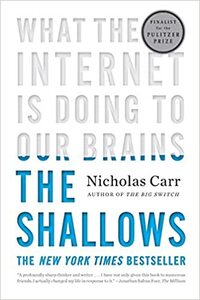You need to sign in or sign up before continuing.
Take a photo of a barcode or cover
informative
medium-paced
This book is fasinating. Carr's research is impeccable and his individual experiences add both context and relatability to the text. Everyone who uses computers and more specifically the internet as a part of their daily routine NEEDS to read this book in order to make informed decisions about their internet consumption.
This book was important and terrifying. It gave voice and shape to many of my concerns about the way internet and technology more generally isn’t just a tool that we use, but a tool that deeply shapes us in the using of it. This is a book of science, not solutions, so I’ll be looking elsewhere for resources that don’t just name the problem but also suggest approaches toward responding.
Review by Chris Swisher
Is the Internet making us stupid? How has information technology evolved and where is it going? How, with the immense, and growing, database of information at our fingertips, can we balance distraction with mindfulness? Nicholas Carr examines these issues in his bestselling book The Shallows.
In covering this essential topic, Carr fluidly ranges from classical philosophy, poetry, neuroscience, and the history of technology.
The digital world, says Carr, is ubiquitous and here to stay. The Internet provides us a fix for ennui, but access to more information most certainly does not make us smarter. Carr reminds us that have a problem here that computers and networks created and most certainly cannot solve. Highly recommended.
On the downside, even though this book is a very readable 228 pages, the “too busy” and distracted among us can read Carr’s 2008 article from The Atlantic Monthly “Is Google Making Us Stupid?” The article is easily found on the – you guessed it – Internet! Shorter treatment, same conclusion.
About the author: Nicholas Carr is an acclaimed writer on technology and culture. The Wall Street Journal called this book “Absorbing and Disturbing,” American Scientist called it “A Book Everyone Should Read.” The Shallows was a runner up for the Pulitzer Prize.
Check availability on The Shallows
About the reviewer: Chris Swisher has loved working at the Reference Desk at Tredyffrin Public Library for almost two years. Before joining the staff at the library, he was a director in the computing center at Franklin & Marshall College and an adjunct faculty member at Drexel University. When not working at the reference desk, Chris edits AdLib, the library’s weekly newsletter and takes photos for the library website. Ask Chris a question about cycling or photography.
Is the Internet making us stupid? How has information technology evolved and where is it going? How, with the immense, and growing, database of information at our fingertips, can we balance distraction with mindfulness? Nicholas Carr examines these issues in his bestselling book The Shallows.
In covering this essential topic, Carr fluidly ranges from classical philosophy, poetry, neuroscience, and the history of technology.
The digital world, says Carr, is ubiquitous and here to stay. The Internet provides us a fix for ennui, but access to more information most certainly does not make us smarter. Carr reminds us that have a problem here that computers and networks created and most certainly cannot solve. Highly recommended.
On the downside, even though this book is a very readable 228 pages, the “too busy” and distracted among us can read Carr’s 2008 article from The Atlantic Monthly “Is Google Making Us Stupid?” The article is easily found on the – you guessed it – Internet! Shorter treatment, same conclusion.
About the author: Nicholas Carr is an acclaimed writer on technology and culture. The Wall Street Journal called this book “Absorbing and Disturbing,” American Scientist called it “A Book Everyone Should Read.” The Shallows was a runner up for the Pulitzer Prize.
Check availability on The Shallows
About the reviewer: Chris Swisher has loved working at the Reference Desk at Tredyffrin Public Library for almost two years. Before joining the staff at the library, he was a director in the computing center at Franklin & Marshall College and an adjunct faculty member at Drexel University. When not working at the reference desk, Chris edits AdLib, the library’s weekly newsletter and takes photos for the library website. Ask Chris a question about cycling or photography.
Only got interesting in the second half but also kind of ironic that I couldn’t focus through some parts of the book
pretty interesting, but I wish I had read it when it first came out (over a decade ago) because a lot of the language and references are so dated
So I'm supposed to be scared after reading this... but how can I be? New technology is not the enemy if you have your own brain.
Very interesting book, which addressed concerns I have had about wading in the shallows (the net and it's small bits). But somehow this book is reassuring to me. Even if you notice that you are addicted to the shallows, it doesn't have to define you or encompass you. Force down time, read a book, get outside, (and I add, listen to music), and your deep thinking will hum with pleasure.
According to Carr and the research he cites, deep thinking makes us smarter, better at what we are doing, and more empathetic. That is not to say that we can't thoroughly enjoy ourselves in the shallows! We must just watch that it doesn't overtake our lives, and our brain.
According to Carr and the research he cites, deep thinking makes us smarter, better at what we are doing, and more empathetic. That is not to say that we can't thoroughly enjoy ourselves in the shallows! We must just watch that it doesn't overtake our lives, and our brain.
Well, the Internet is probably pretty bad for our brains. Good news though, as a species we have survived equally momentous intellectual technologies like the clock, the map, and the printing press. We will adapt to the internet but at the cost of losing the ability to contemplate at length and deeply. Many of us no longer have the ability to sit and read a book. Most disturbingly, Carr tells us that the number and variety of citations in scientific research has been greatly reduced since the advent of the internet. Even scientists are succumbing to the ease of a simple Google search and not looking much deeper. Aaaugh!
Quotes…
As more journals moved online, scholars actually cited fewer articles than they had before.”
― Nicholas Carr, The Shallows: What the Internet is Doing to Our Brains
Quotes…
As more journals moved online, scholars actually cited fewer articles than they had before.”
― Nicholas Carr, The Shallows: What the Internet is Doing to Our Brains
preachy, looking to place the blame on the internet as opposed to oneself for one's shortcomings. Some valid insights in the book but it really feels like fear mongering as opposed to honest reflections.







